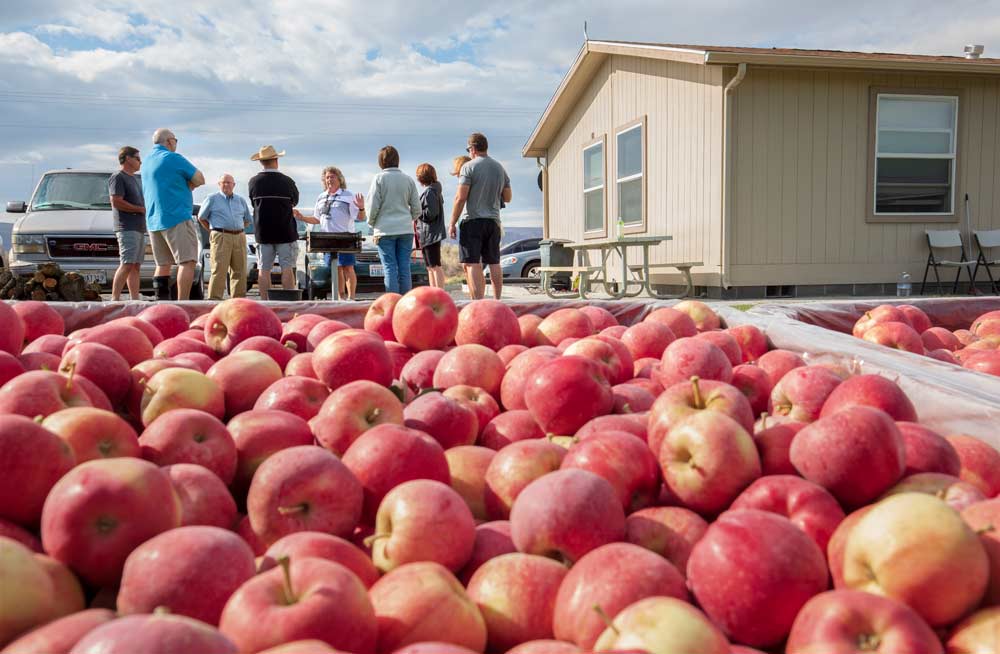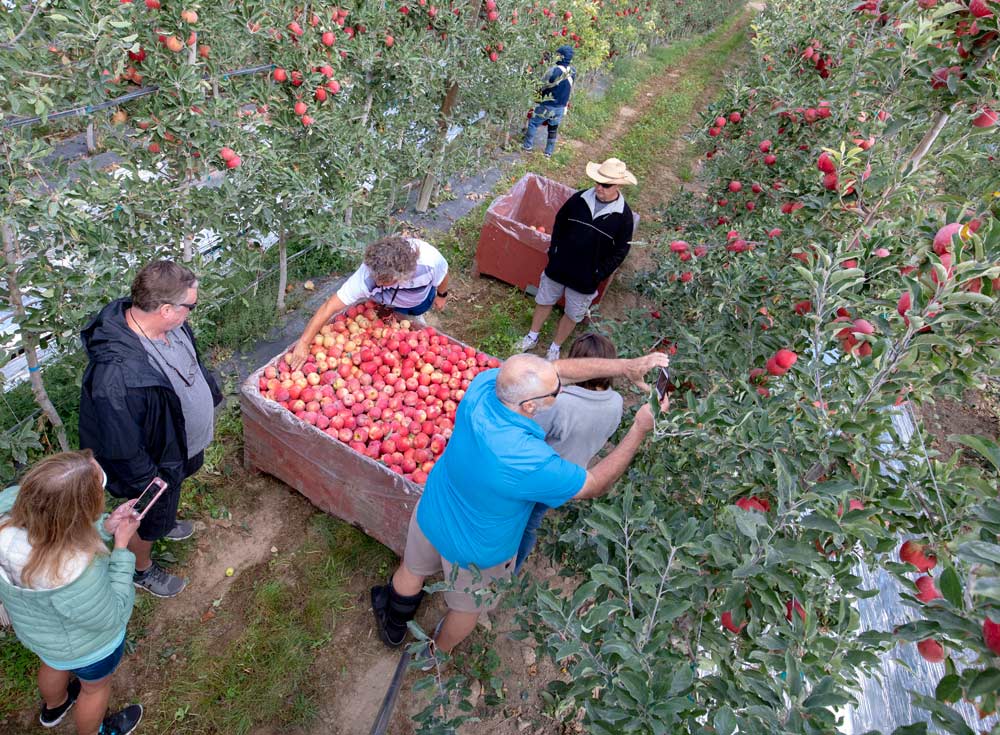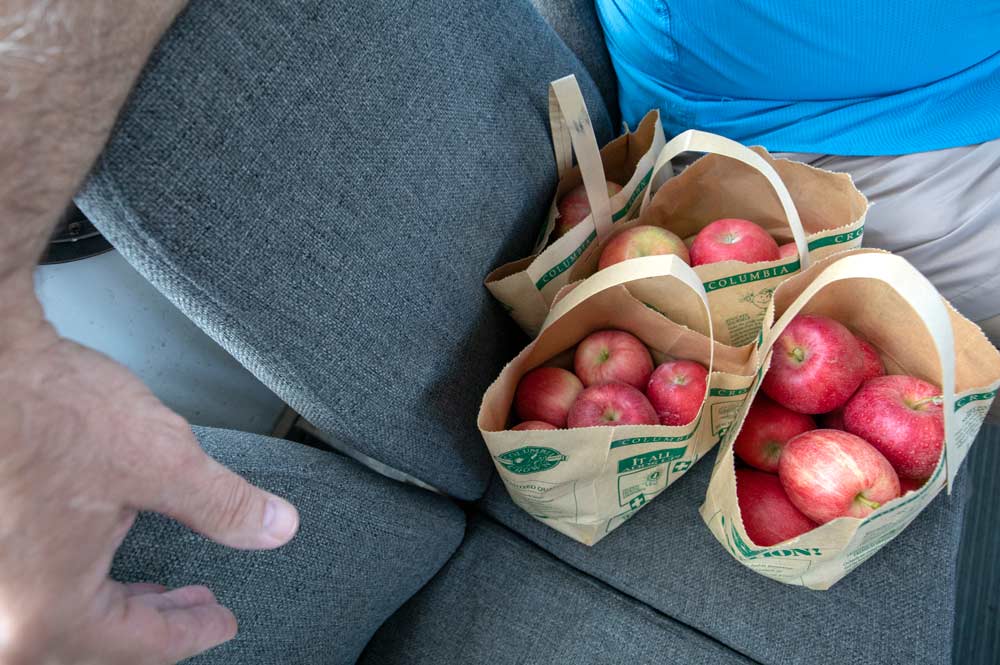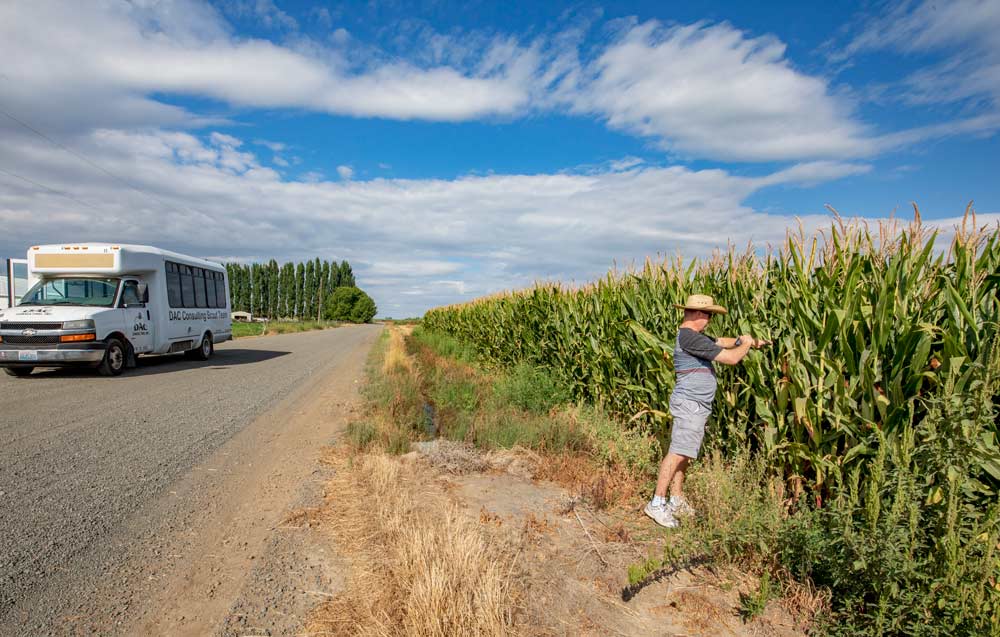
Dain Craver viewed selling his orchard to a team of investors as an opportunity, not a takeover. The Royal City, Washington, grower used the influx of cash to continue farming, create a plan for the end of his career and still leave something for his six daughters, someday.
“I was just looking for a good exit strategy,” said Craver, age 62 and nearing retirement.
He’s one of many. As the fruit industry modernizes and grows, it becomes more capital intensive. Accordingly, growers and packers have sought outside investment to pay for new plantings, orchard machinery and packing equipment. Insurance giants, pension funds and university endowments all have ownership in orchards and packing houses today, mostly in Washington state.
“There’s a lot of stuff going on (industry wide),” said Peter Verbrugge, principal owner of Valley Fruit in Wapato, Washington. He’s working on a capital investment package for his company but declined to discuss it until it’s finished. Several other vertically integrated companies are in similar discussions, while small grower arrangements such as Craver’s are becoming more common.
However, don’t assume the industry is being bought out by “stupid money,” as one fruit executive quipped. Outside investors are showing a lot of interest, for sure, but the fruit companies themselves are seeking the changes, said Michael Butler, chairman and CEO of Cascadia Capital, a Seattle investment firm.
“It’s more the growers and packers looking for capital,” said Butler, a frequent speaker at tree fruit industry meetings. “It’s definitely being driven by the growers and packers.”
Butler’s firm typically represents the fruit companies, but right now it’s a buyer’s market. More companies are looking for investors than there are groups to finance them. The interested investors are patient and willing to pay more for a good company.
“At least right now, it’s not dumb money, I can say that,” Butler said.

Recent moves
One of the milestone deals came when the Vanguard International Group purchased Wapato’s Pride Packing Co. in 2017. Based in Issaquah, Washington, Vanguard is an international fruit production and marketing company with offices and facilities all over the world. Pride, now called Vanguard Pride, is a vertically integrated fruit company with 3,000 acres and three packing facilities.
Butler called the Pride acquisition “clearly the canary in the coal mine,” foreshadowing upcoming mergers of similar scale. Costs of production will go higher and only capitalized firms will keep up, leaving four, five or six companies dominating the market. The same thing is happening to fruit retailers and supply companies, too. In fact, it happens in every industry.
“I’m not saying it’s a good thing or a bad thing, but I think it has to happen,” he said.
West Mathison, CEO of Stemilt Growers in Wenatchee, Washington, considers investment groups as a tool for companies to finance needed change and growth.
“Outside investment is just a mechanism to help achieve a company’s strategy,” he said, though he declined to discuss any deals related to Stemilt. “The outside investors don’t change the industry; the investors are there as a result of the need to change.”
The fruit companies are showing caution, too, said Jeff Cleveringa, research and development director for Wenatchee’s Oneonta Starr Ranch Growers, one of the larger companies in the fruit business. Starr Ranch Growers has entertained orchard investment suitors but has not found a fit, Cleveringa said. “We just haven’t come across the right orchard investment partnership.”
Finding the right partners
So, what is the right partnership? A patient one.
That’s the most common advice from investment managers and economic experts. Clark Seavert, an agricultural economist at Oregon State University, has heard of investors wanting quarterly financial statements from a cherry producer. “In the fruit industry and in most of agriculture, that just doesn’t make sense,” he said.
Investment in the fruit industry comes in waves, and this is not the first.

On a relatively small scale, Doug Stockwell’s family has been working with a group of New York investors since 1979, he said. “We are not part of the current movement, at all,” said Stockwell, general manager of The Highland Partnership in Wenatchee.
The family orchard business, led by Stockwell’s father, Vern, used the influx of capital for major expansions in orchard ground through the 1980s and in the years since. Today, the company has more than 1,000 acres near Bridgeport, Washington, with a diverse array of varieties, including the proprietary Envy and SugarBee.
On a larger scale, Dole Food Co. was a large investor in the 1970s, said Desmond O’Rourke, president of the Pullman, Washington, fruit marketing analysis company Belrose Inc. Even Alcoa Corp., the aluminum giant, once owned an orchard next to its plant in Wenatchee, while much of the vast acreage in the Columbia Basin was funded by outside investors in previous decades, O’Rourke said.
More recently, the popular Enza club varieties Jazz and Envy were bought by New Zealand fruit giant T&G Global (formerly Turners and Growers), which now is a wholly owned subsidiary of BayWa Group, an $18.2 billion German energy and building material company. A titan like that can afford to lose money on an orchard. “For them, moving $20 million into the apple industry is a drop in the bucket,” O’Rourke said.
If they don’t like the results, they’ll just walk away. “Not a problem for them,” he said.
However, patience can prevail.
A shared long-term view is one reason Fall Line Capital of San Mateo, California, was able to convince a Central Washington family to partner with the investment group on a new orchard, said Eric O’Brien, co-founder and managing director. Unlike some groups, O’Brien represents an evergreen fund, which has no time limit for holding assets.
The grower involved declined an interview with the Good Fruit Grower, O’Brien said, but here’s how their deal played out. O’Brien and the farmer knew each other socially through a common alma mater and casually discussed a parcel the fund had purchased for potatoes and alfalfa. The grower told O’Brien the location would work well for tree fruit, and a partnership emerged. The fund purchased the land and paid for the trees, trellises and other capital costs of development, while the orchardist promised to pay a set lease plus a share of the profits.
They completed the deal in early 2017. The orchard is under 500 acres and there is no packing facility involved. Meanwhile, the vast majority of the family’s orchards are still unrelated to the investment group.
The arrangement works, O’Brien said, because both parties take a long view. Fall Line lowered its risk by asking for the lease and working with an experienced orchardist. The grower used the up-front capital to develop the orchard to the tune of $40,000 to $50,000 per acre and enter the expensive club apple arena, freeing them to invest their own money in other elements of their operation.
The fund, known more for row crop farmland and agricultural technology investments, is eyeing the Northwest fruit industry for more projects but probably won’t pull the trigger soon because of concerns about increasing supply with uncertain markets in the face of trade wars. Maybe in a few years, O’Brien said. “The market (will likely) get worse before it gets better,” he said.

Management and a good team
Jim Jackson, the investment leader who works with Craver, puts quality farm management at the top of the wish list for investment groups. “That’s the hardest piece of the puzzle,” he said. “The money is really quite easy.”
With a good farm manager, a good location and the right variety and rootstock combinations, a farm can average 12 percent to 15 percent return on investment. That’s attractive over the course of seven years for an investor, he said.
He suggests large and small growers use that attraction to their advantage. “It can be a great opportunity for young farmers to finance operations and redo their orchard into the right varieties,” he said.
Or, use investment as a generational transition tool.
In Craver’s case, selling his orchard to investors gave him a chance to write his own industry swan song.
Craver and Jackson go way back. For more than 20 years, Craver had consulted on some of Jackson’s other orchards. The formal company of New Royal Bluff Orchards started five years ago and, since then, has added property and brought in new investors. All told, including new plantings this winter, the company will hold about 500 acres of fruit, mostly apples, scattered throughout Central Washington’s Royal Slope.
The investors initially offered Craver a partnership, but he chose to turn over control instead. The company hired Craver as the manager, while he took half of the proceeds from the sale in cash and half in shares. He remains one of the larger investors.
Jackson, a Seattle resident, lives part-time in his Royal City home, while the rest of the investors, some of them from Texas, flew out to visit the orchard in August. They all have learned enough about the fruit industry to be flexible, Craver said.
“A lot of these financial guys come up with a budget, and it’s made in rock,” Craver said.
Craver plans to spend another five years running the orchard. After that, he and his wife, Gari Lynn, may keep their business, DAC Consulting, through which they help neighboring orchardists manage for pests and disease. Meanwhile, the investors may someday want to expand into packing facilities.
For now, Craver is just happy to work with people he trusts. “I wouldn’t have done this with (just) anybody,” he said. •
—by Ross Courtney
Related: Investment advice for orchardists






Leave A Comment